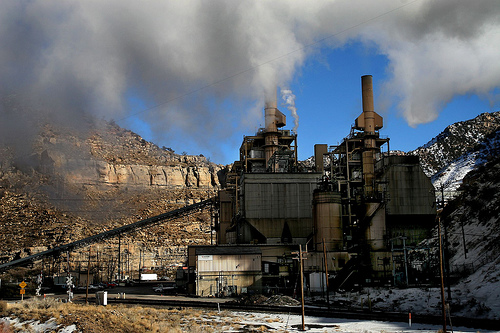Michael G. Morris
Chairman of the Board
President and Chief Executive Officer
American Electric Power
September 17, 2010
Dear Mike,
I am writing about your letter of September 15, 2010, urging the Senate to enact legislation that would prevent EPA from issuing rules under the Clean Air Act to limit greenhouse gases for at least two years. While you sent this letter in your role as Chair of a Business Roundtable task force, I know you well enough to believe that you personally agree with the statements in the letter. With that in mind I want to provide you with my reasons for strongly disagreeing with those claims.
You start by arguing that the Clean Air Act is not well-designed to regulate “ubiquitous pollutants like carbon dioxide emissions, whose impact is global, not local or regional.” That argument might apply to the Act’s ambient standards programs but EPA has made it clear that it has no intention of applying those provisions of the law to greenhouse gases. Rather, the agency has stated that it will use the law’s technology-based provisions to achieve reductions in these pollutants. These provisions are as well-suited to greenhouse gas pollutants as they are to the range of traditional pollutants for which EPA has developed emission performance standards over the past 40 years.
The core boundary on EPA’s authority for emission performance standards, including “best available control technology” (BACT) and New Source Performance Standards (NSPS), is that the standards must be supported by a thorough record documenting the technical and economic reasonableness of any standard the agency adopts. These findings of reasonableness are required to be made on a category by category basis, and in the case of BACT, on a source by source basis.
EPA’s use of these provisions will implement an entirely sensible policy to apply modern techniques to reduce emissions from major new investments in our nation’s industrial infrastructure, in a manner that is compatible with sustainable economic growth. The claim that implementing these common sense provisions would drive up consumer costs and damage U.S. competitiveness is simply without any factual basis. To the contrary, a path that would encourage investments that will lock our economy into a high carbon pathway is the real threat to consumer well-being and competitiveness.
As CEO of American Electric Power you have recognized that action by the U.S. to cut its emissions is a necessary step to engage other countries in similar efforts. Congressional backtracking on the Clean Air Act — a law it has already enacted and that the Supreme Court has concluded applies to greenhouse gases — would set back efforts by the U.S. to demonstrate the leadership that is essential to securing the cooperation of other countries in addressing this global threat. I know that you and other Business Roundtable leaders understand that ill-considered actions by the U.S. can damage progress toward our international objectives.
The current Administration has tried to break the international log-jam on climate protection by stating the commitment of the U.S. to reduce its emissions by reasonable amounts by 2020. Timely exercise of the Clean Air Act performance standard authorities can contribute to that effort even if the Congress delays in enacting the more comprehensive legislation that you and I agree is needed. Action by EPA would properly be seen as good faith progress by the U.S. and would enhance our ability to secure more action from other countries. In contrast, enactment of the legislation you seek would send a signal that the U.S. cannot be counted on as a reliable partner in a global effort to tackle this problem.
Your letter emphasizes that the delay you seek is for two years and that it would allow time to formulate approaches that to develop needed new technologies. I have several disagreements with this argument. First, investments are being made now and there are a range of available resource choices with quite different greenhouse emissions profiles. Blocking EPA action for the extended time contemplated in this legislation will skew decisions away from alternate, available resources with lower carbon emissions.
Second, the legislation you support is not limited to delaying the effectiveness of EPA rules for two years. Rather, it is drafted to prevent EPA from taking any action related to rule development during the proposed two year period. So, in practice, the delay imposed by such a provision would last years longer. Third, such a provision, once enacted, will be a convenient predicate for extending the delay with successive enactments of the same provision. This technique was used to bar action to improve fuel economy standards year after year during the 1990s. Indeed, before the legislation you support has even been voted on, influential members of Congress are making public statements about renewing it. Nothing in the legislation itself nor in the dynamics prevailing in Congress creates meaningful incentives to use the time period when EPA is blocked to develop alternative legislative approaches.
In reality, the most likely result of enactment of such a delay would not be to stimulate increased efforts to develop a legislative consensus on climate protection. Rather, hamstringing EPA would empower those who have succeeded in preventing action by Congress on broad climate legislation for years now. That will serve neither the interests of climate protection nor the interests of the many Business Roundtable members who face genuine problems in making rational business plans as long as U.S. climate policy remains in an unresolved, contentious state. Enactment of a provision like the Rockefeller proposal would assure an increase in controversy surrounding U.S. energy policy and every major emitting energy project. That turn of events would make it harder, not easier, to find common ground on how to move forward.
Mike, I know you have worked hard to move AEP from a stance of opposition to public health and environmental progress to a forward-looking posture that emphasizes cooperation. Those efforts have already produced dividends that benefit AEP and the public generally. This effort to handcuff EPA from taking any action, no matter how moderate, on greenhouse gases is unnecessary and inconsistent with the approach you have taken up to now. Rather than urging a meat-ax approach by Congress to block EPA from carrying out the law, why don’t you join us in working with EPA to develop common-sense performance standards that will reduce uncertainty while moving us in the right direction on climate protection?
With best wishes,
David G. Hawkins
Director, Climate Programs
NRDC



